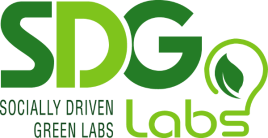The SDG Labs digital gallery provides an online repository with a wide range of ready-to-use and interactive co-creation activities, tools and resources, and a digital package of lecture projects that will support the development of social and green business competences.
Specifically, the SDG Labs digital gallery consists of the following οnline elements:
• An online screening tool with case studies of SEEs that operate in economic sectors with environmental objectives (e.g. rural development, renewable energy, re-use and recycling, sustainable housing and agriculture) and/or incorporate green practices and environmental-friendly approaches into their activities.
• A digital package of Lecture Plans providing clear and easy to follow steps in order to deliver lessons that incorporate the aspect of environmental sustainability and cultivate students’ skills related to green transition in specific SE courses.
• An online depository of interactive and co-creation activities supporting social and green entrepreneurial competence development that can be utilized by university teachers when implementing the SDG Labs programme. This depository is flexible, and universities can select the resources that suit their context and the needs of their students.
Czech (57) Dutch (57) English (81) Greek (57) greenskills (7) Polish (57) SDGLabs (7) SDGLabsE+ (7) sustainability (7)
Case Study: Major Development Agency Thessaloniki
Major Development Agency Thessaloniki S.A. is an enterprise operating in the wider area of
Thessaloniki with the purpose of developing a coherent “Strategic Sustainable Urban Development Of The Major Integrated Spatial Investment Of Urban Metropolitan Thessaloniki”.
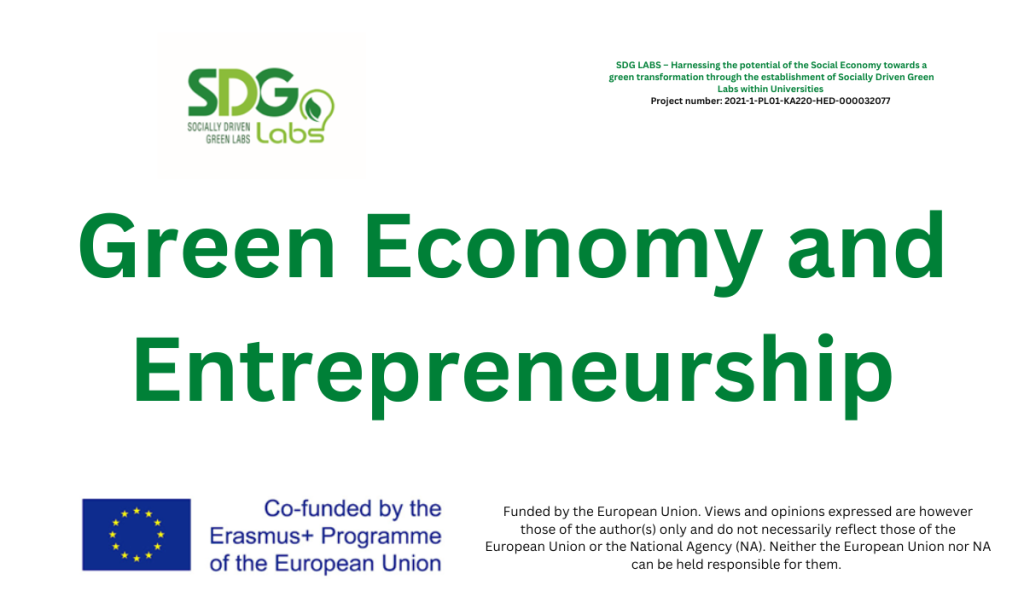
Case Study: Development Agency Of Karditsa (ANKA S.A.)
ANKA has been aiming in the enhancement of local development through the coordination of initiatives, the provision of technical support to local authorities and businesses and the implementation of project on the basis of cooperation and autonomy.
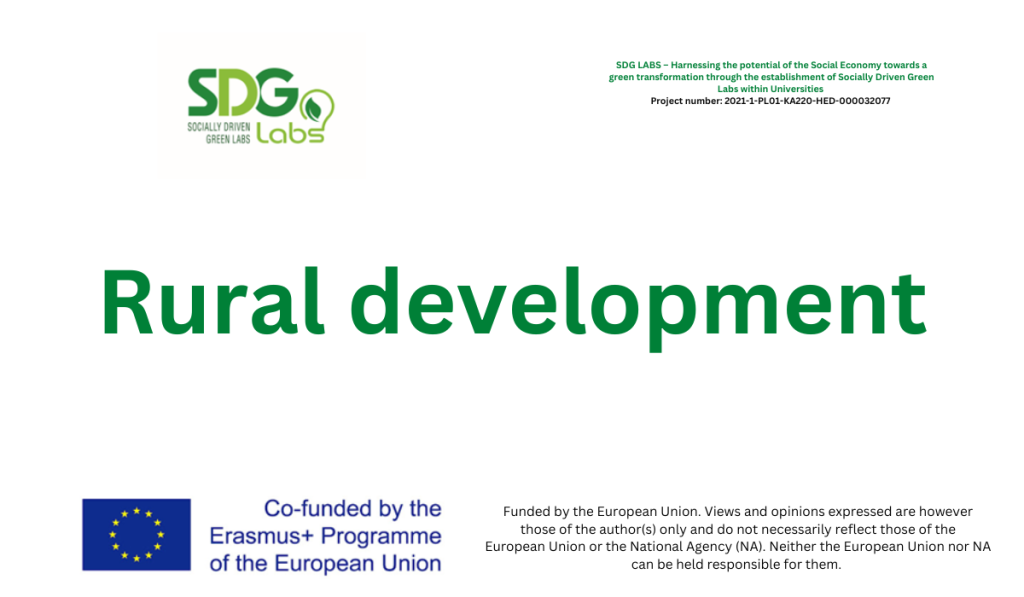
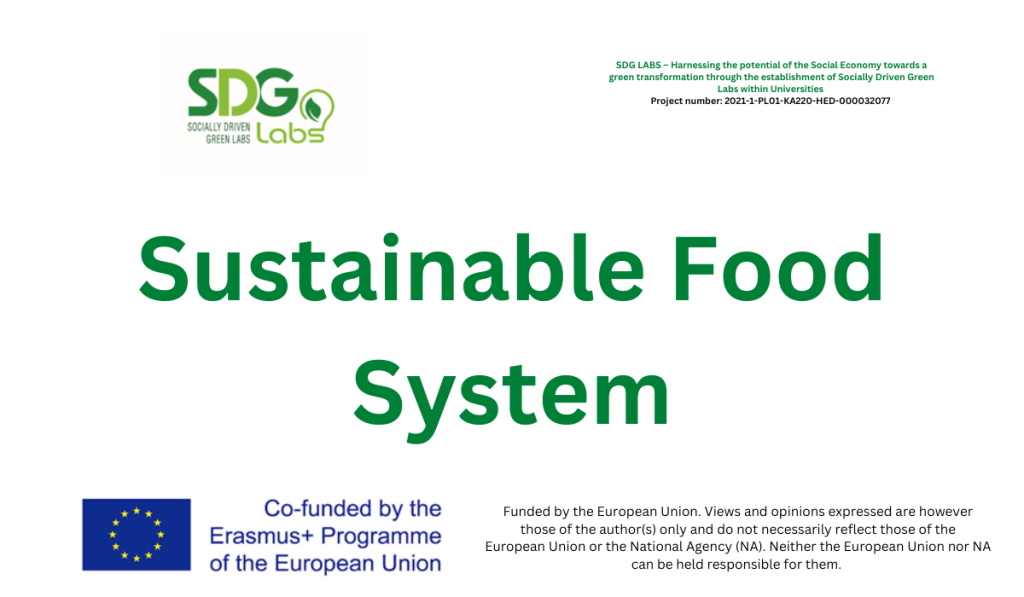
Lecture Plan: How To Produce, Process, And Deliver Safe And Nutritious Food – Sustainable Food System In Everyday Life
Lecture topics: 1. Increasing demands on food industry – from farm to fork 2. The concept of the sustainability of the food industry 3. Consumer as a key agent in the transition towards sustainable food systems
Lecture Plan: How To Build In a Circular Way
Lecture topics: Responsible innovation in construction, consumer choices for green building. 1. The idea of sustainable construction 2. Benefits and costs of sustainable construction 3. How to implement responsible innovation in construction at the level of supply and demand?
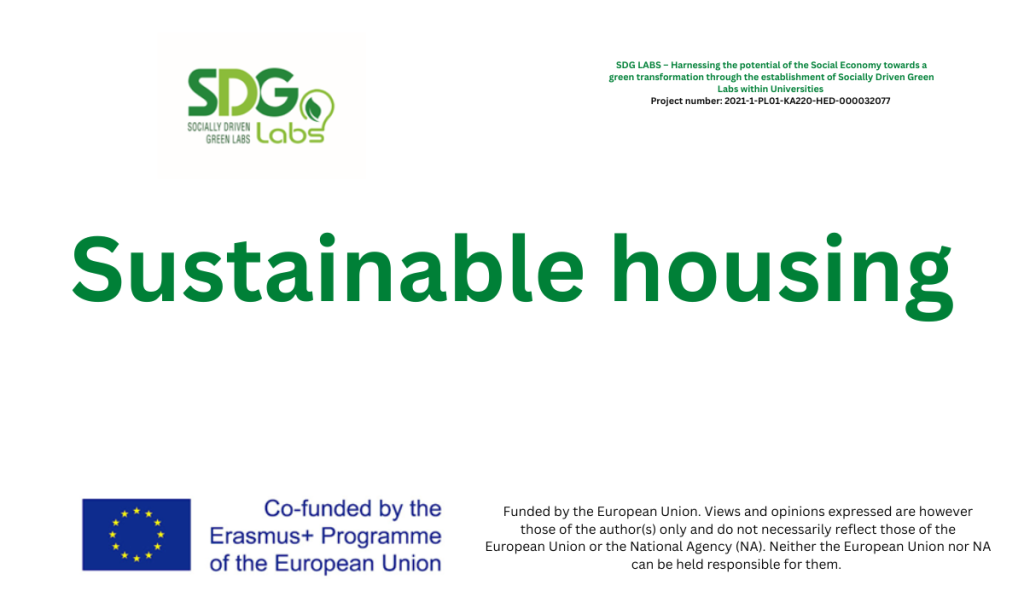
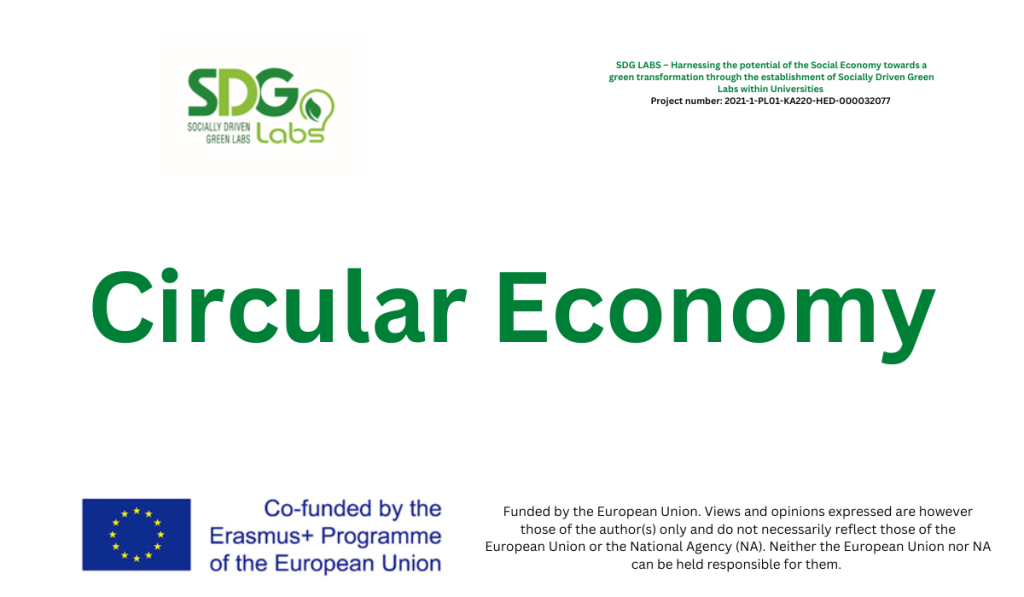
Case Study: Together For The Environment Social Cooperative
The purpose of establishing the Together for the Environment Social cooperative was to create an entity that will carry out tasks in the field of municipal waste management and, at the same time, to enable the professional and social activation of the residents of both municipalities.
Case Study: NRG Solar Foundation
The Foundation implements projects in the field of renewable energy sources, improvement of energy efficiency, energy management systems and sustainable energy development of renewable energy sources (including photovoltaic installations, heat pumps) for households and business clients.
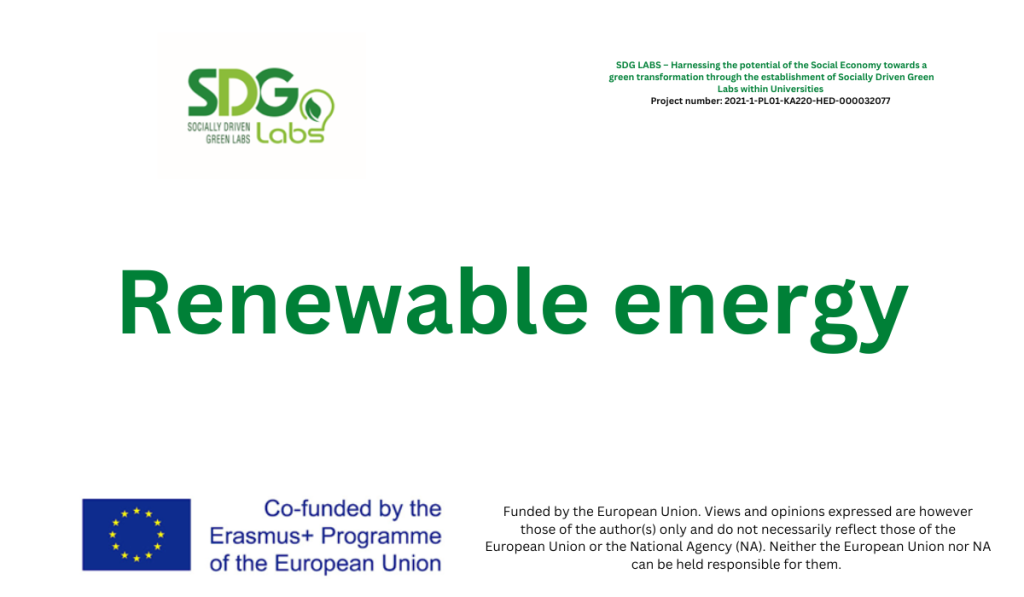
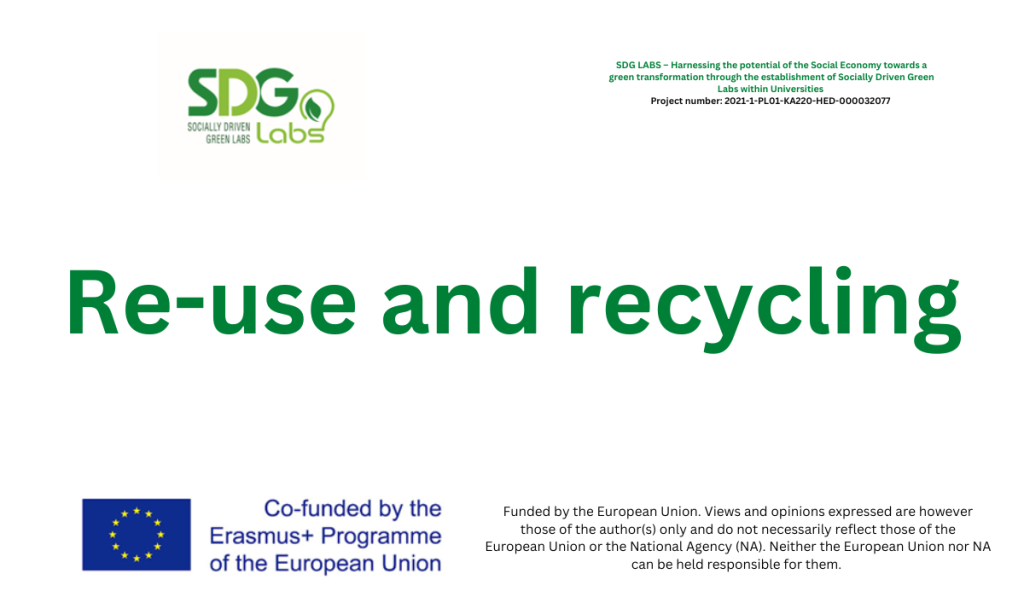
Lecture Plan: How To Consume In a Circular Way – Circular Economy In Everyday Life
Lecture topics: Circular economy, circular consumption, circular behaviours. 1. The idea of circular economy 2. Pros and Cons for circular economy 3. How I can incorporate the circular economy into my daily life?
Case Study: To Good To Go: Fighting Food Waste Together
Through their app, Too Good to Go connects users with restaurants nearby, allowing them to purchase the excess food that would otherwise be thrown away thirty minutes before closing hours at a discounted price.

Case Study: Development Agency Of Karditsa (ANKA S.A.)
ANKA has been aiming in the enhancement of local development through the coordination of initiatives, the provision of technical support to local authorities and businesses and the implementation of project on the basis of cooperation and autonomy.


Case Study: Fundacja Kupuj Odpowiedzialnie [Buy Responsibly Foundation]
The Buy Responsibly Foundation is a nationwide organization in Poland working for sustainable development and environmental protection, responsible consumption, and production, as well as respect for human rights and environmental principles in business.

Case Study: Fundacja Kupuj Odpowiedzialnie [Buy Responsibly Foundation]
The Buy Responsibly Foundation is a nationwide organization in Poland working for sustainable development and environmental protection, responsible consumption, and production, as well as respect for human rights and environmental principles in business.
Lecture Plan: Consumption Of Renewable Energy
Lecture topics: 1. Genesis and types of the renewable energy sources 2. European, Governmental and local authorities instruments to encourage households, companies to introduce renewable energy sources 3. Good practices related to renewable energy sources in European countries


Case Study: Social Cooperative Komunalka Rzgow
The Social Cooperative Komunalka Rzgow has been formed by legal persons. The aim of the cooperative is the social and professional reintegration of people at risk of social exclusion and the provision of public services to the local community – for the well-being of the whole community.

Case Study: Fundacja Kupuj Odpowiedzialnie [Buy Responsibly Foundation]
The Buy Responsibly Foundation is a nationwide organization in Poland working for sustainable development and environmental protection, responsible consumption, and production, as well as respect for human rights and environmental principles in business.
Case Study: Inspekt Foundation / Traditional uses of Plants-Workshop
The INSPEKT’s mission is to diagnose social needs, integrate the researchers, and care of natural heritage. They are engaged in social monitoring and create a platform for cooperation with local authorities, entrepreneurs and other NGOs.

Case Study: The Ale Smacznie Social Cooperative
The Socienia Spółdzielnia Socjalna Ale Smacznie, which is partly supervised by Dąbie Municipality (and of which Dąbie Municipality is the owner), solves three main local social problems: catering services for city cleaning and maintenance of green areas, and the newest service is rehabilitation of the elderly or those in need of such medical assistance.


Case Study: Spoldzielnia Socjalna Zielona Pila (Social Cooperative Zielona Pila)
The Social Cooperative Zielona Pila has set itself the goal of helping the unemployed and those at risk of social exclusion by creating jobs related to the services the organization offers.
Case Study: To Good To Go: Fighting Food Waste Together
Through their app, Too Good to Go connects users with restaurants nearby, allowing them to purchase the excess food that would otherwise be thrown away thirty minutes before closing hours at a discounted price.


Case Study: Fundacja Sendzimira [Sendzimir Foundation]
The Sendzimir Foundation is a non-profit organisation operating in Poland. Its activities focus on the adaptation of cities to climate change, including the adaptation of water infrastructure and the modernisation of buildings in order to apply solutions in cities to reduce CO2 emissions and slow down the process of global warming.
Case Study: To Good To Go: Fighting Food Waste Together
Through their app, Too Good to Go connects users with restaurants nearby, allowing them to purchase the excess food that would otherwise be thrown away thirty minutes before closing hours at a discounted price.

Case Study: To Good To Go: Fighting Food Waste Together
Through their app, Too Good to Go connects users with restaurants nearby, allowing them to purchase the excess food that would otherwise be thrown away thirty minutes before closing hours at a discounted price.


Lecture Plan: How To Consume In a Circular Way – Circular Economy In Everyday Life
Lecture topics: Circular economy, circular consumption, circular behaviours. 1. The idea of circular economy 2. Pros and Cons for circular economy 3. How I can incorporate the circular economy into my daily life?
Case Study: TACKLING CLIMATE CHANGE THROUGH FOOD WASTE MANAGEMENT
In the past few years, the challenging issue of extreme Food Waste has arisen, especially in urban areas, contributing to the overall food insecurity, environmental degradation and unsustainable development. Boroume (“We Can”) a non-profit organization based in Athens, had been established with its core mission to reduce food waste, by saving food, and fight malnutrition in Greece.


Case Sudy: “BOROUME” SAVING FOOD, SAVING LIVES NON-PROFIT ORGANIZATION
In the past few years, the challenging issue of extreme Food Waste has arisen, especially in urban areas, contributing to the overall food insecurity, environmental degradation and unsustainable development. Boroume (“We Can”) a non-profit organization based in Athens, had been established with its core mission to reduce food waste, by saving food, and fight malnutrition in Greece.
Case Study: TACKLING CLIMATE CHANGE THROUGH FOOD WASTE MANAGEMENT
In the past few years, the challenging issue of extreme Food Waste has arisen, especially in urban areas, contributing to the overall food insecurity, environmental degradation and unsustainable development. Boroume (“We Can”) a non-profit organization based in Athens, had been established with its core mission to reduce food waste, by saving food, and fight malnutrition in Greece.


Case Sudy: TACKLING CLIMATE CHANGE THROUGH FOOD WASTE MANAGEMENT
In the past few years, the challenging issue of extreme Food Waste has arisen, especially in urban areas, contributing to the overall food insecurity, environmental degradation and unsustainable development. Boroume (“We Can”) a non-profit organization based in Athens, had been established with its core mission to reduce food waste, by saving food, and fight malnutrition in Greece.
Case Study: “BOROUME” SAVING FOOD, SAVING LIVES NON-PROFIT ORGANIZATION
In the past few years, the challenging issue of extreme Food Waste has arisen, especially in urban areas, contributing to the overall food insecurity, environmental degradation and unsustainable development. Boroume (“We Can”) a non-profit organization based in Athens, had been established with its core mission to reduce food waste, by saving food, and fight malnutrition in Greece.

Case Study: TACKLING CLIMATE CHANGE THROUGH FOOD WASTE MANAGEMENT
In the past few years, the challenging issue of extreme Food Waste has arisen, especially in urban areas, contributing to the overall food insecurity, environmental degradation and unsustainable development. Boroume (“We Can”) a non-profit organization based in Athens, had been established with its core mission to reduce food waste, by saving food, and fight malnutrition in Greece.


Case Sudy: RENEWING OLD FURNITURE, KABINET CB, RE USE CENTRE
The company was founded in 2019, the idea came from a community project to provide material assistance to users of social services in České Budějovice. Donated unused furniture was provided to clients in social flats.
Case Study: NILMORE
The founder of the company is Mikuláš Hurta (born in 1995). In an interview with CzechCrunch he said: “I was sitting in the director’s chair of the IAC aircraft paint shop, where I realized over time that one spends a third of one’s life at work, so it pays to transform this work into something socially and environmentally useful…

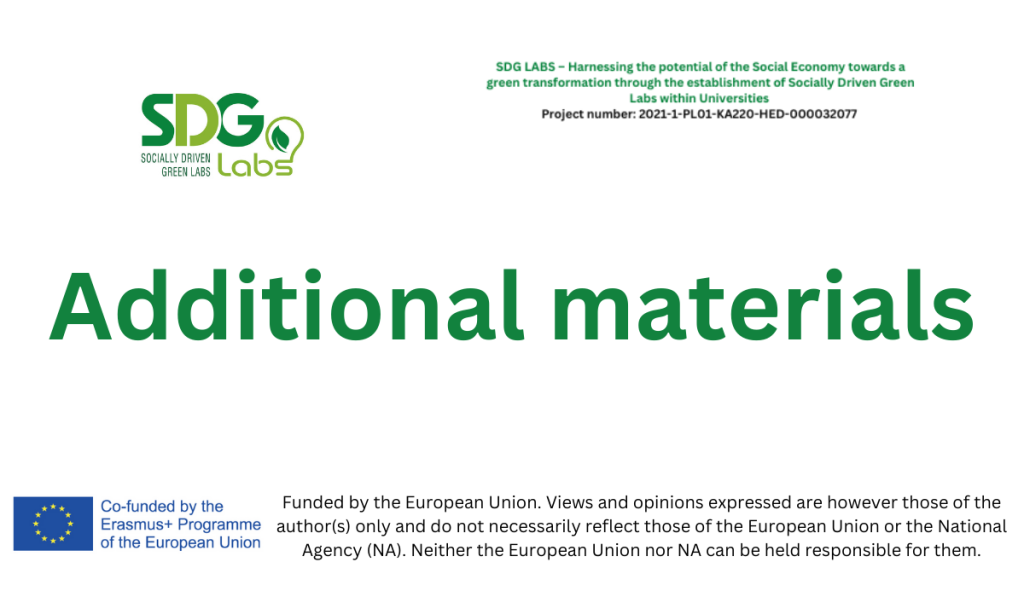
Minimum Viable Product – Task & Lecture
What all can be called a prototype based on social enterprises you already came into contact with?
What is Minimum Viable Product?
What is Minimum Feature Set?
How useful it will be to know these things for your social enterprise business plans?
How can I incorporate the circular economy into my daily life?
The 5 R’s of Waste Management and Zero Waste Living


Double diamond model of Design Council
Design Council’s Double Diamond clearly conveys a design process to designers and non-designers alike. The two diamonds represent a process of exploring an issue more widely or deeply (divergent thinking) and then taking focused action (convergent thinking).
Circular Economy – Pros & Cons
The idea of closing the loop sounds like a great plan doesn’t it? There are however- as with anything- pros and cons. Let’s look at some of them.


GREEN SKILLS as an element of green transformation
Green skills are perceived as composed of three dimensions classified as cognitive, psychomatic and affective. The promotion of sustainable development within these dimensions involves knowledge, skills and values.
Purpose task
Aaron Hurst from his lecture for Social Entrepreneurship Academie:
We gain purpose from relationships. This is the biggest source of purpose. We gain purpose from having relationships with each other. From impact, when we do something for someone else, and it doesn’t have to be something gargantuan or on a world scale…


Questionnaire – Circular behaviour in households and the quality of life of their inhabitants
This questionnaire is for the purpose of investigating behaviours related to the implementation of the circular economy by households and assessing the impact of these behaviours on their quality of life.
The Value Proposition Canvas
The Value Proposition Canvas is a plug-in tool to the Business Model Canvas. It allows you to describe your Value Propositions and the target Customer Segments in more detail and evaluate the “fit” between the value you intend to create and the expectations your customers have.


Meeting Halfway – Understanding Circular Behaviours among Households as a Starting Point for Business Practices
Purpose: The main aim of the article is to identify the households’ behaviours that can be described as ‘circular’, as well as, the analysis of the possible facilitation of their implementation through the specific product and service offers prepared by the companies.
Between declaration and action
An analysis of the results of research on circular behaviours taken up by the households and perceived benefits from them.


Circular behaviours undertaken by Polish households
The main aim of the paper is to analyse and evaluate the possible relation between circular behaviours undertaken by the households and the socio-economic features describing them. The paper presents the results of the author’s research conducted among Polish households on the territory of two voivodeships: Podkarpackie and Małopolskie.
Circular economy – a new concept or a necessity
This article presents the idea of a circular economy (ce) as a practical implementation of postulates of the sustainable development of the economy. The focus is on the current situation of the use of natural resources and their capacity to meet global needs.


Circular Economy as an Answer to the Challenge of Improving the Quality of Life
This paper is an attempt to presents the influence the idea of circular economy on improving the quality of life.
Circular Economy – Developing a Causal Loop Diagram
Learning outcome: to gain an understanding and experience on how to build Causal Loop Diagrams and apply it in the area of circular economy


Consumption in circular way
From linear to circular economy. To be more circular. Definition of circular behaviours. Circular Behaviours.
Renewable Energy – Developing a Causal Loop Diagram
Learning outcome: to gain an understanding and experience on how to build Causal Loop Diagrams and apply it in the area of Renewable Energy

Sustainable Food System – Developing a Model
Learning outcome: to gain an understanding and experience on how to build models


Sustainable Food System – Open Ended Questions
Learning outcome: To understand the notions of System Dynamics model
Sustainable Food System – Developing a Quantitative Model
Learning outcome: to gain an understanding and experience on how to build Quantitative models and apply it in the area of Renewable Energy


Sustainable Housing – Systemic Thinking
Learning outcome: to gain a first understanding of how systemic thinking works and gain insights on the difference between individual behavior and collective consequences
Sustainable Housing – Developing a Causal Loop Diagram
Learning outcome: to gain an understanding and experience on how to build Causal Loop Diagrams

